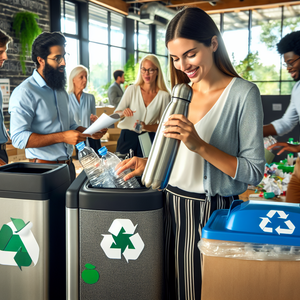Sustainability in Schnucks Careers: Paving the Way for a Greener Future

Schnucks has long been recognized for its dedication to community engagement and high-quality offerings. However, in recent years, the company has taken significant strides toward sustainability. This commitment is manifested in various aspects of its operations, from sourcing local produce to implementing waste reduction strategies. Schnucks aims to minimize its environmental footprint while enhancing the overall shopping experience for its customers. For instance, Schnucks has made substantial investments in energy-efficient technologies, such as LED lighting and advanced refrigeration systems, reducing energy consumption across its stores. Additionally, the company has adopted water conservation practices, including low-flow fixtures and rainwater harvesting systems, to further lessen its environmental impact. These initiatives not only benefit the planet but also demonstrate Schnucks' commitment to responsible business practices.
Careers Supporting Sustainability Initiatives
The integration of sustainability into Schnucks' business model has opened a range of career opportunities that not only benefit the company but also contribute to the community and the environment. Here are a few key areas where employees are making a significant impact: 1. Sourcing Local Produce: Schnucks has established partnerships with local farmers and producers, ensuring that a substantial portion of its inventory comes from nearby sources. This strategy supports local economies and reduces the carbon footprint associated with long-distance transportation. Employees in these roles are dedicated to cultivating relationships with local suppliers and ensuring that customers have access to fresh, sustainable produce. For example, Schnucks’ partnerships with local farms provide seasonal items that not only taste better but are also harvested at their peak freshness. 2. Waste Reduction Programs: Schnucks has implemented various waste reduction initiatives, such as composting organic waste and donating unsold food to local food banks. Careers in this area involve working with waste management and community organizations to ensure that food waste is minimized and that those in need are supported. Employees are empowered to make decisions that directly impact the community, fostering a sense of pride in their work. According to reports, Schnucks has diverted thousands of pounds of food waste from landfills each year while simultaneously supporting local food banks, making a profound impact on food insecurity in the areas it serves. 3. Energy Efficiency: The company has invested in energy-efficient technologies to reduce energy consumption across its stores. Careers in facilities management and sustainability coordination involve assessing energy use, implementing energy-saving measures, and monitoring progress. Employees in these roles play a crucial part in driving Schnucks' sustainability goals forward. For instance, Schnucks has implemented energy audits and retrofitting programs that have resulted in a significant reduction of greenhouse gas emissions, showcasing the tangible impact of their efforts.
Training and Development Opportunities
Recognizing the importance of continuous learning, Schnucks provides training and development programs focused on sustainability. Employees have access to workshops and resources that educate them on eco-friendly practices, enabling them to champion these initiatives within the company. This investment in employee education not only enhances individual skill sets but also fosters a culture of sustainability throughout the organization. Employees are encouraged to share their knowledge and experiences, creating a collaborative environment that promotes sustainable practices company-wide.
Success Stories and Impact
To illustrate the impact of these sustainability initiatives, consider the story of Sarah, a Schnucks employee who started as a produce clerk and is now a sustainability coordinator. Sarah's journey reflects the company's commitment to professional growth and sustainability. Her role involves collaborating with local farmers, implementing waste reduction programs, and educating fellow employees about sustainable practices. Sarah’s efforts have not only improved Schnucks' sustainability metrics but have also inspired her colleagues to engage in eco-friendly practices. Her story is just one example of how Schnucks empowers employees to drive meaningful change in their communities.
Schnucks is demonstrating that a commitment to sustainability can go hand-in-hand with career development and community support. By creating roles that focus on eco-friendly practices, the company enhances its operations while empowering employees to make a positive impact. As the grocery industry continues to evolve, Schnucks is leading the way in integrating sustainability into its business model, paving the way for a greener future while providing valuable career opportunities. Employees at Schnucks are not just part of a grocery chain; they are champions of sustainability, contributing to a healthier planet and a stronger community. Through their dedication and innovative practices, Schnucks is setting a precedent for other businesses to follow, proving that environmental responsibility is not only achievable but essential for long-term success.
Sustainability Coordinator
Grocery chains like Schnucks, Whole Foods, and regional supermarkets
Core Responsibilities
Develop and implement sustainability programs that align with company goals.
Collaborate with local suppliers to enhance sourcing practices that prioritize eco-friendly products.
Monitor and report on sustainability metrics and progress toward environmental goals.
Required Skills
Strong understanding of sustainability principles and practices.
Excellent communication and interpersonal skills for stakeholder engagement.
Proficient in data analysis and reporting software.
Energy Efficiency Specialist
Large retailers, commercial property management firms, and utility companies
Core Responsibilities
Conduct energy audits to identify opportunities for energy savings in store operations.
Recommend and implement energy-efficient technologies and practices.
Track energy consumption and report on savings achieved through efficiency initiatives.
Required Skills
Knowledge of energy management systems and sustainability certifications (e.g., LEED).
Analytical skills to assess energy use data and develop strategies for improvement.
Technical proficiency in energy modeling software.
Local Sourcing Manager
Grocery chains, farm-to-table restaurants, and food cooperatives
Core Responsibilities
Establish and maintain relationships with local farmers and producers to ensure a sustainable supply of goods.
Evaluate and select suppliers based on sustainability criteria and quality standards.
Coordinate local sourcing initiatives and promote seasonal products to customers.
Required Skills
Strong negotiation and relationship-building skills.
Familiarity with local agriculture and supply chain logistics.
Passion for sustainability and local community engagement.
Waste Management Coordinator
Grocery stores, food banks, and environmental NGOs
Core Responsibilities
Oversee waste reduction initiatives including composting and food donation programs.
Collaborate with local organizations to facilitate food recovery and support community needs.
Analyze waste management data to identify areas for improvement and report results.
Required Skills
Knowledge of waste management regulations and practices.
Strong project management skills to coordinate various initiatives.
Ability to engage and educate employees and community members on waste reduction efforts.
Environmental Compliance Analyst
Corporations with sustainability initiatives, government agencies, and consulting firms
Core Responsibilities
Ensure that company operations comply with environmental laws and regulations.
Conduct audits and assessments of sustainability practices and environmental impact.
Develop compliance reports and provide recommendations for improvement.
Required Skills
Strong understanding of environmental regulations and compliance standards.
Experience with environmental impact assessments and reporting.
Attention to detail and strong analytical abilities.


